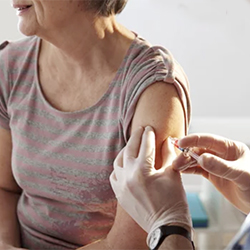By Marie Rosenthal, MS
In a post on X, Robert F. Kennedy Jr., said the FDA rescinded the emergency use authorizations for the COVID-19 vaccines, which allowed for a wider distribution, but approved for marketing the vaccines made by Moderna, Novavax and Pfizer and BioNTech.
“These vaccines are available for all patients who choose them after consulting with their doctors,” said Mr. Kennedy, the secretary of the Department of Health and Human Services.

This is a misleading statement because younger adults and healthy children are not indicated for vaccination—even if their physicians recommend them—unless they have an underlying condition that puts them at risk for severe COVID-19, according to the new indications.
The 2025-2026 formula for the COVID-19 vaccines will be a monovalent JN.1-lineage vaccine composition, which was recommended in May by the Vaccines and Related Biological Products Advisory Committee, the FDA said. “Based on the totality of the evidence, FDA has advised the manufacturers of the approved COVID-19 vaccines that to more closely match currently circulating SARS-CoV-2 viruses, the COVID-19 vaccines for use in the United States beginning in fall 2025 should be monovalent JN.1-lineage-based COVID-19 vaccines (2025-2026 Formula), preferentially using the LP.8.1 strain,” the agency said on its website.
Pfizer said that its vaccine, Comirnaty LP.8.1 mRNA vaccine, was approved for use in adults 65 years of age and older, and people 5 through 64 years with at least one underlying condition that puts them at high risk for severe outcomes from COVID-19.
Moderna said both its Spikevax and mNexspike vaccines, which also target the LP.8.1 variant of SARS-CoV-2, were granted the greenlight by the FDA. The updated formula for Spikevax is indicated for people 6 months through 64 years of age with at least one underlying condition that puts them at high risk for severe outcomes from COVID-19, and all adults 65 and older. mNexspike, Moderna’s new COVID-19 vaccine, is approved for people 12 through 64 years of age with at least one underlying condition that puts them at high risk for severe outcomes from COVID-19, and all adults 65 and older.
The approvals and recommendations contradict experts, including the CDC, which said COVID-19 vaccines can be given to children, even healthy children, after a consultation with their doctors. The American Academy of Pediatrics recently issued recommendations to that effect.
Susan J. Kressly, MD, FAAP, president of the American Academy of Pediatrics, called the restricted approvals "deeply troubling” for children and young adults. “The American Academy of Pediatrics remains focused on increasing access to vaccines for all children, in all communities. As we enter respiratory virus season, any barrier to COVID-19 vaccination creates a dangerous vulnerability for children and their families. Respiratory illnesses can be especially risky for infants and toddlers, whose airways and lungs are small and still developing,” she said in a statement.
“The AAP recommends the COVID-19 vaccine for all children ages 6 months through 23 months. Beyond age 2, we recommend annual shots for children and teens with health conditions that make COVID-19 especially risky. Any parent who wants their child vaccinated should have access to this vaccine; today’s unprecedented action from HHS not only prevents this option for many families, but adds further confusion and stress for parents trying to make the best choices for their children. Parents and pediatricians, together, make the best decisions to protect children’s long-term health,” Dr. Kressly said, and urged the administration to allow these decisions to remain in the handls of families and their doctors.
“COVID-19 vaccines remain our best tool to prevent severe disease, hospitalization and death due to COVID-19 — for healthy adults, children, pregnant patients and others at higher risk. The scientific evidence continues to strongly support broad vaccination far beyond the limited populations outlined in the Food and Drug Administration’s new label. By narrowing its approval, FDA has made a decision that completely contradicts the evidence base, severely undermines trust in science-driven policy and dangerously limits vaccine access, removing millions of Americans’ choice to be protected and increasing the risk of severe outcomes from COVID," said Tina Tan, MD, the president of the Infectious Diseases Society of America.
“Physicians can still provide COVID vaccines off-label, and IDSA strongly urges doctors to continue recommending and administering vaccination to their patients based on the best available science. However, pharmacists’ ability to provide off-label vaccines may be severely constrained, underscoring the vital role of physicians and other clinicians in maintaining access," Dr. Tan said. “IDSA calls on insurers to continue covering COVID vaccines consistent with multiple medical society recommendations and scientific evidence, and we urge Congress to conduct strong oversight of the Administration’s decision to restrict Americans’ freedom to choose vaccination as we approach the upcoming respiratory virus season.”
She added that IDSA is working with other medical societies to finalize updated guidelines for COVID vaccination in both healthy and immunocompromised adults as part of its comprehensive respiratory virus guidance for this fall and winter. Expect those recommendations this fall, she said.
With the FDA’s decision, Moderna’s updated vaccines are expected to be available in the coming days.
“Protecting people at increased risk of severe outcomes from COVID-19 is imperative to public health as COVID-19 was responsible for up to 4 million outpatient visits and nearly half of a million hospitalizations last year,” said Stéphane Bancel, the CEO of Moderna.
{RELATED-HORIZONTAL}
